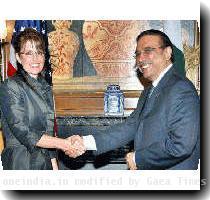Pakistani government wrestles with fallout of amnesty’s end as pols face renewed graft cases
By Nahal Toosi, APSaturday, December 19, 2009
Pakistani ruling party grapples with amnesty’s end
ISLAMABAD — Pakistan’s ruling party grappled Saturday with fallout from a court decision that stripped the U.S.-allied president and other leaders of amnesty from past corruption cases, but a party spokeswoman insisted affected Cabinet ministers would not be forced to quit.
The central leadership of the Pakistan People’s Party met in the afternoon to review the Supreme Court ruling, which has already prompted travel bans, court summonses and other law enforcement moves against politicians who face revived graft and other charges.
Wednesday’s ruling has deepened the political turmoil in Pakistan just as Washington has increased pressure on Islamabad to stay focused and do more to aid the war effort in neighboring Afghanistan.
President Asif Ali Zardari enjoys constitutional immunity from prosecution, but his opponents say they now intend to challenge his very eligibility for the post. He has defied the opposition’s calls that he resign on moral grounds.
Asked if other Cabinet officials now vulnerable to revived charges would be asked to leave, Zardari aide and party spokeswoman Farahnaz Ispahani said such ministers had no legal obligation to quit, and that it would be inappropriate to fire people when they were merely accused.
“You’re not guilty until you’re proven so,” Ispahani said.
Anti-corruption courts across the country issued summons on Friday to more than 100 suspects, including Interior Minister Rehman Malik — a figure seen as very close to the Americans — and presidential secretary Salman Farooqi, court officials said.
The summons came a day after the Interior Ministry issued a list of nearly 250 officials, including Malik and Defense Minister Ahmed Mukhtar, who were barred from leaving the country following the Supreme Court’s decision.
After immigration officials stopped Mukhtar from boarding a plane to China on Thursday, the ruling party became defiant.
Prime Minister Yousuf Raza Gilani criticized the ban, suspended the secretary of the interior, Qamar Zaman, and ordered an inquiry.
“Stopping the defense minister from going on an official trip to a very friendly country brought a bad name to the country,” Gilani told reporters. State media reported that he also defended Zardari, saying the allegations against him were old and had never been proven.
Zardari, who spent years in prison on corruption allegations, has always insisted he was innocent and that charges against him were politically motivated.
But the Supreme Court ruling has been welcomed by many Pakistanis, who viewed the graft amnesty as an immoral piece of legislation that whitewashed the crimes of the elite.
It was introduced as part of a U.S.-backed deal to allow Zardari’s wife, the late Benazir Bhutto, to return from self-imposed exile in 2007 and contest elections knowing she would not be prosecuted for corruption accusations she said were motivated by sinister politics.
“They are stealing our resources, so if cases against them are reopened, it is good,” said Islamabad resident Nasar Rehman as he shopped at a market in the capital.
The turmoil comes at a challenging time for the Washington-Islamabad relations. The Obama administration needs political stability in Pakistan to succeed in neighboring Afghanistan, where violence against U.S. and NATO troops is running at all time highs.
The White House wants Pakistan to do more to eliminate insurgent safe havens on its territory along the Afghan border.
Associated Press Writer Munir Ahmad contributed to this report.
Tags: Afghanistan, As-pakistan, Asia, Asif Ali Zardari, Bribery, Central Asia, Graft And Conflicts Of Interest, Islamabad, North America, Pakistan, Political Corruption, Political Issues, Political Organizations, Political Parties, South Asia, United States

